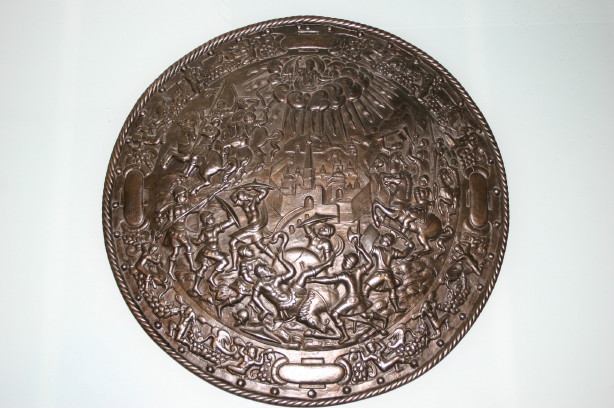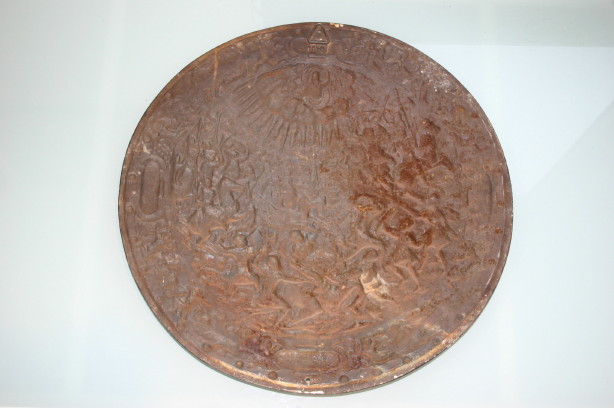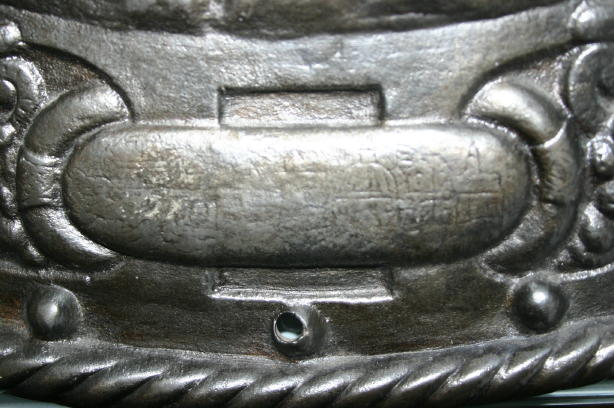| Author |
Message |
|
Robert Sheldon
|
 Posted: Sun 21 Jan, 2007 12:10 am Post subject: What type of shield is this and what time period is it from? Posted: Sun 21 Jan, 2007 12:10 am Post subject: What type of shield is this and what time period is it from? |
 |
|
Hello folks, this is my first post here. Does anyone know what type of shield this is, what time period, and how to determine if it is authentic? I note that there are some clues. Its 22" across, the God at top is holding a Christian icon in his left hand, and the village depicted has a dome roof amongst other spiked roofs. Could this be Moorish?
Any feed back would be most appreciated. Thank you.
 Attachment: 88.87 KB Attachment: 88.87 KB

|
|
  |
 |
|
Wolfgang Armbruster
|
 Posted: Sun 21 Jan, 2007 1:56 am Post subject: Posted: Sun 21 Jan, 2007 1:56 am Post subject: |
 |
|
I can only say one thing with absolute cerainty: it's definitely not Moorish. Islam forbids the depiction of humans.
Maybe it's a parade shield. Do you have more information on this one? Where did you get it from etc. 
|
|
  |
 |
|
Geoff Wood
|
 Posted: Sun 21 Jan, 2007 3:21 am Post subject: Posted: Sun 21 Jan, 2007 3:21 am Post subject: |
 |
|
| Wolfgang Armbruster wrote: | I can only say one thing with absolute cerainty: it's definitely not Moorish. Islam forbids the depiction of humans.
.  |
North African art did not usually depict people, but to broaden the statement to all Islamic cultures is a step too far. Islam does not forbid the depiction of humans.
http://www.pbs.org/empires/islam/cultureart.html
|
|
  |
 |
|
Wolfgang Armbruster
|
 Posted: Sun 21 Jan, 2007 5:09 am Post subject: Posted: Sun 21 Jan, 2007 5:09 am Post subject: |
 |
|
| Geoff Wood wrote: | | Wolfgang Armbruster wrote: | I can only say one thing with absolute cerainty: it's definitely not Moorish. Islam forbids the depiction of humans.
.  |
North African art did not usually depict people, but to broaden the statement to all Islamic cultures is a step too far. Islam does not forbid the depiction of humans.
http://www.pbs.org/empires/islam/cultureart.html |
I stand corrected 
Seems like conservative islam shapes our idea of that particular religion, but that is a different topic.
|
|
  |
 |
|
Steve L.
|
 Posted: Sun 21 Jan, 2007 7:23 am Post subject: Posted: Sun 21 Jan, 2007 7:23 am Post subject: |
 |
|
Looks like a renaissance round shield. But i´m not very tough with that era! 
|
|
  |
 |
Sean Belair
Industry Professional

|
 Posted: Sun 21 Jan, 2007 11:02 am Post subject: Posted: Sun 21 Jan, 2007 11:02 am Post subject: |
 |
|
|
the figures look like victorian depictions of romans.
|
|
  |
 |
|
Allan Senefelder
Industry Professional
|
 Posted: Sun 21 Jan, 2007 11:21 am Post subject: Posted: Sun 21 Jan, 2007 11:21 am Post subject: |
 |
|
|
Fom the front it appears to be a Victorian era cast version of a 16th century parade shield. Is there anything on the back, rings and chain for hanging, rivets and washers? Is there any trace of fabric or leather on the back? Is the shield thick and heavy with a grainy texture to the back or is it of moderate weight with a smoother complexion to the back. Is the edge actually rolled over a piece of wire or round metal rod or is it a cast round shape?
|
|
   |
 |
|
Robert Sheldon
|
 Posted: Sun 21 Jan, 2007 1:49 pm Post subject: Posted: Sun 21 Jan, 2007 1:49 pm Post subject: |
 |
|
| Allan Senefelder wrote: | | Fom the front it appears to be a Victorian era cast version of a 16th century parade shield. Is there anything on the back, rings and chain for hanging, rivets and washers? Is there any trace of fabric or leather on the back? Is the shield thick and heavy with a grainy texture to the back or is it of moderate weight with a smoother complexion to the back. Is the edge actually rolled over a piece of wire or round metal rod or is it a cast round shape? |
Wow. Thanks for all of the input here so far.
I have attached a picture of the back. It has a bit of oxidation (should I have this cleaned/stabilized?) in the grooved back areas as well as hand made rivets holding the hanger piece in place. The texture of the back is not really grainy or smooth, but in between. I do not see any evidence that this has had leather affixed to it anywhere. As you may have noticed, there are two holes drilled - one at top and one at bottom.
The shield is at least 1/4" to 5/16" thick at the edges. It weights 13.5 pounds.
When I was asking about the potential for being Moorish, I was referring to the town depicted. Sorry for the confusion. I have read that when towns are depicted that they are most often real. Apparently the town is in the mountains as you can see small buildings in the mountains that are interspersed with the battle. Finally, the four 3”-3.25” inch ovals have engravings on them, but are faint due to wear of some kind. I have also attached a close up of one of the ovals – it continues the village maps, but is different than what is at center. I wonder if the four ovals are additional villages that this shield’s namesake governed.
Thanks again for all the input.
 Attachment: 58.81 KB Attachment: 58.81 KB

Shield, back
 Attachment: 63.44 KB Attachment: 63.44 KB

Close-Up of Engraved Bottom Oval
|
|
  |
 |
|
Allan Senefelder
Industry Professional
|
 Posted: Sun 21 Jan, 2007 5:47 pm Post subject: Posted: Sun 21 Jan, 2007 5:47 pm Post subject: |
 |
|
|
Can't help you with the depiction on it but this shield is a Victorian product, most likely cast iron. It has value in its own right as an antique. These were produced for hanging on walls to decorate during the Victorian medieval revival.
|
|
   |
 |
|
Robert Sheldon
|
 Posted: Sun 21 Jan, 2007 9:27 pm Post subject: Posted: Sun 21 Jan, 2007 9:27 pm Post subject: |
 |
|
| Allan Senefelder wrote: | | Can't help you with the depiction on it but this shield is a Victorian product, most likely cast iron. It has value in its own right as an antique. These were produced for hanging on walls to decorate during the Victorian medieval revival. |
I'm not so much interested in the value as that there may be a story behind it - even if it is a reproduction. On a lesser note, I am somewhat curious as to what if anything it should be insured for, but my suspicion is that it is not a significant amount.
|
|
  |
 |
|
|

